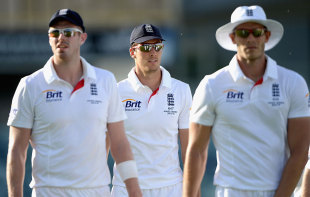The role is still evolving, but it's hard to see it become the centrepiece of the narrative like in football
Ed Smith in Cricinfo
March 3, 2014

| |||
Where is cricket's Jose Mourinho, its Pep Guardiola, its Sir Alex Ferguson?
I intend no disrespect to cricket coaches. But the question is unavoidable. The football manager has evolved not only as the boss - the "gaffer" - but also the central and controlling mind. He is the team's selector, its tactician and its figurehead. Compare cricket's separation of powers, a three-way division of responsibility. The selectors determine which players get onto the field; the captain sets the field, declares and changes the bowling; while the coach - well, hang on a minute, what does the coach do? This second question partly answers my first one: the role of the coach leads us to the absence of Jose Mourinho.
The original football manager was Herbert Chapman, whose first job was at Northampton Town in 1907. He pioneered a new style of play, rebranded his teams (it was Chapman who termed Arsenal "the Gunners"), and signed players at lower prices by plying rival directors with alcohol while he sipped ginger ale from a whisky glass. No wonder his nickname was "Football's Napoleon". That tradition of managerial control continues to this day. Arsenal's club captain is Thomas Vermaelen. You may not have noticed because he very rarely makes the team. The manager, Arsene Wenger, in contrast, is ever-present.
With occasional exceptions - meddling owners, egotistical chairmen, exceptional captains - there is no doubt who runs a football team: the manager. This has long made them the envy of the coaching fraternity. When the Welsh rugby visionary Carwyn James, who coached the British Lions, was asked if he had any regrets, he replied that he would have liked to be a football manager instead: they didn't have to put up with the interference of selectors.
Cricket didn't even have coaches when James was shaping his teams in the 1970s, let alone Chapman his in the 1910s. English cricket's first full-time professional coach was Micky Stewart, who took over as team manager for the 1986-87 tour of Australia. But Stewart and his generation of coaches were managers in name, not reality. They were more organisers than bosses. David Lloyd, who succeeded Stewart in the England job, put it like this: "The captain ruled the roost, he was the boss really, and you were there to support him. So I wouldn't cross either of the captains I worked with, Atherton or Stewart."
So history, clearly, is part of the explanation. The cricket coach is relatively new. There has not yet been much time for cricket's pioneering coaches to expand and enhance the role. One perfectly plausible projection is that cricket will become more like other sports and a single manager will assume control of the central decisions. Michael Vaughan believes that selectors are now superfluous and their role should been ceded to the coach. Sir Clive Woodward, who coached England to the rugby World Cup, recently accused cricket of being "stuck in the dark ages", with an over-mighty captain and a weak manager. Woodward was baffled that English cricket could sack Kevin Pietersen before the appointment of a new coach. Surely, Woodward argued, that decision was for the coach, not the captain and administrators? This line of argument holds that the cricket coach is still taking infant steps towards its logical evolution and that - in a decade or two - the coach will be king.
| A football coach can alter the effect of individual players by tinkering with the structure in which they operate. Cricket, in contrast, is the accumulation of what statisticians call "discrete" events, actions that occur in a comparative vacuum | |||
There is a counter argument. Ian Chappell and Shane Warne, among others, believe that the cricket coach should be held in check rather than allowed to launch a power grab. At international level, in Warne's words, "the coach shouldn't be coaching." The coach can certainly help create the right environment. But the Warne-Chappell approach remains suspicious of interventionist technical coaching once players have reached Test level. They believe it must be the captain, not the coach, who runs the team on the field.
This is the nub of the issue. Is there something about cricket, almost unique among sports, that makes it harder (perhaps impossible) for a coach to shape what happens during the match? We know it is the baseball manager who pulls off the pitcher and replaces him with a fresher arm. We know it is the football manager who devises the playing system and structure for each match. Why not cricket?
We now run into a parallel question: how central is captaincy? For if the coach wishes to become the defining figure, he can assume selection control from the selectors, but tactics he must wrestle from the captain. As a teenager, I was 12th man for Kent in a one-day match. I organised the drinks bottles while sitting next to the coach. When Kent took a wicket and I prepared to run onto the pitch, the coach pulled me to one side. "Tell the captain to change the bowling at the far end and move mid-off deeper. And tell him that has come from me!" I relayed the message. "Tell the coach to f*** off and let me captain the team," the captain replied, "and tell him that's from me." It was an early lesson in a familiar confusion about roles and responsibilities.
The structure of cricket may work against an off-field mastermind, certainly in the longer formats of the game. In a five-day match, the coach can only directly speak to his players at lunch, tea or the close of play. During each session, the captain must make his own decisions - as Bob Woolmer discovered when his coach-to-captain walkie-talkie system was outlawed in 1999. It is possible to imagine a T20 match mapped out in advance because there are only a small number of bowling changes to make. But a Test match is so fluid and unpredictable, with so many moving parts interacting and influencing each other, that a "planned" Test is a contradiction in terms.
In other respects cricket is anything but fluid. The ball is "live" in cricket for a very small percentage of the match. And for the vast majority of that time, only two or three players are involved: the bowler, the batsmen and sometimes a fielder. Crucially, their individual actions take place in perfect isolation. No one else can help you hit a cover drive or bowl a yorker. This truth is captured by the old cliché that cricket is a team game played by individuals.
That makes it very different from football. When an attacking player tracks back, the job of being a defender becomes fundamentally easier. When a coach devises a different midfield formation, the experience of being out on the pitch materially changes. The spaces are in different places, so it becomes a changed match. Not so in cricket. A coach (or captain) can change his batting order. But no coach can soften or alter the isolated examination that awaits all the batsmen when they eventually face Mitchell Johnson's thunderbolts. You can shuffle the pack, but the cards must be played individually.
This is the greatest challenge facing a cricket coach. A football coach can alter the effect of individual players by tinkering with the structure in which they operate. The presence of a good defensive midfielder frees up the playmaker to push up-field and express himself. Just ask the playmaker. When Real Madrid sold the defensive midfielder Claude Makelele and bought David Beckham instead, Zinedine Zidane felt the pinch. "Why put another layer of gold paint on the Bentley," asked Zidane, "when you are losing the entire engine?" These are managerial judgements, decisions about structure and strategy that affect almost every moment of a football match. Cricket, in contrast, is the accumulation of what statisticians call "discrete" events, actions that occur in a comparative vacuum.
Paradoxically, this makes it harder for cricket coaches to influence the shape of the match. They come up against an impenetrable wall: every player, with bat or ball, is on his own when it really matters. This, I suspect, is why cricket coaches, during periods of desperate failure, are so often reduced to the worst of all managerial failings: telling their players how to bat and bowl. It almost never works, but you can see how they end up there.
By my own logic, cricket coaching could evolve in either of two opposite directions. Given the technical and individual nature of the game, the trend may be towards individual coaches who work for the player, rather than vice versa - exactly as already happens in golf and tennis. Alternatively, cricket may eventually accept a version of the football model, despite its structural differences. One thing is certain. Unless that happens - and I'm not sure it should - I can't see a cricketing Jose Mourinho putting up with the constraints of the job. After all, pity the poor chief selector who relays the following message, "Jose, here's the team we've picked for you to play against Manchester City."



